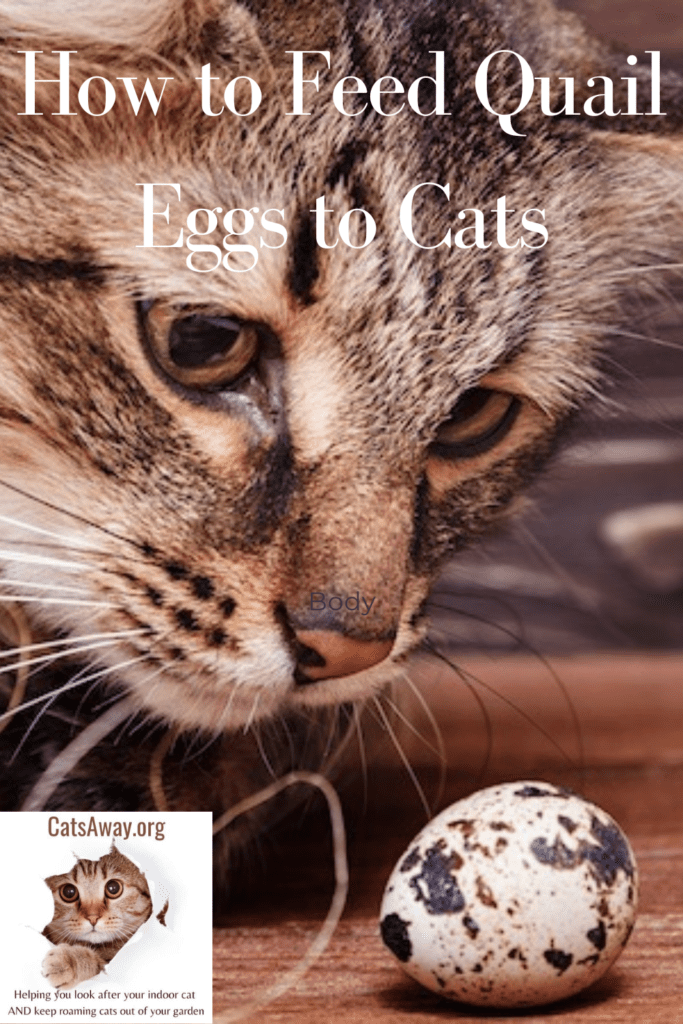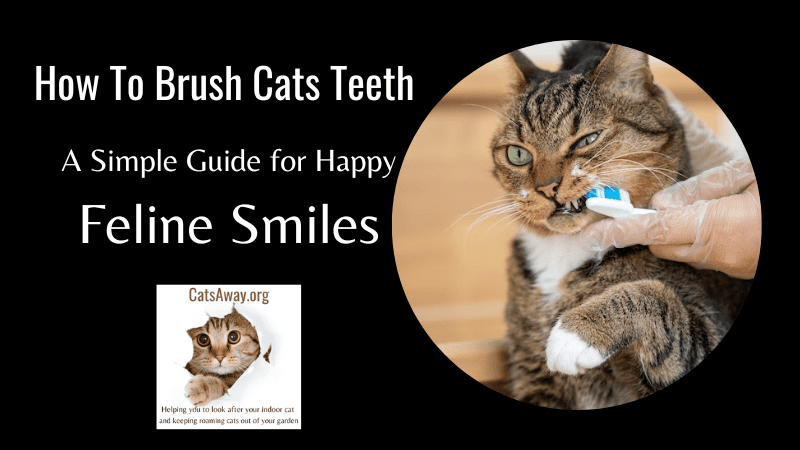Quail eggs are a nutritious addition to a feline’s diet, as they are rich in protein, omega-3 fatty acids, and essential vitamins and minerals. With a high level of digestibility, these tiny eggs can offer numerous health benefits for cats.
Introducing quail eggs into a cat’s meal plan requires careful considerations, including portion size and preparation methods. It is essential to balance these eggs with a cat’s existing diet to ensure they do not consume excessive calories or nutrients.
While many pet owners have discovered the advantages quail eggs can provide, it is important to be well-informed about proper feeding practices. Here I will delve into the specifics about how to feed quail eggs to cats, addressing safe preparation and the potential benefits they can offer.
Understanding Quail Eggs and Their Nutrients
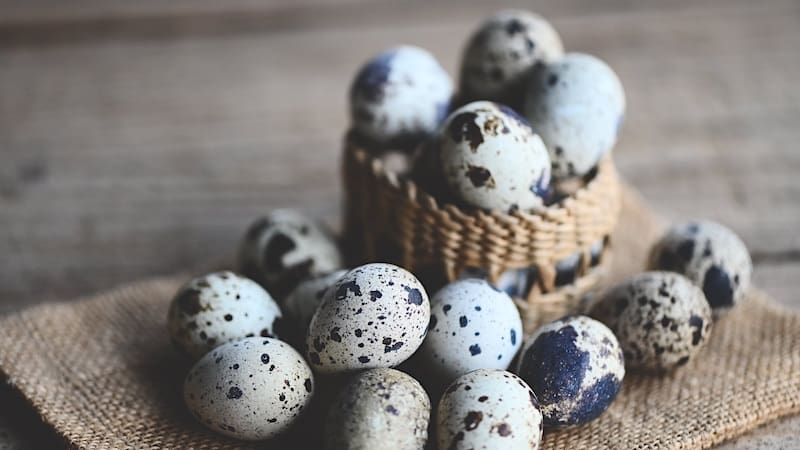
Quail eggs offer a variety of nutrients that are beneficial to cats. In this section, we will explore the nutritional value of quail eggs and the various essential nutrients they contain.
Nutritional Value
Quail eggs are small, with three to four of them being roughly equivalent to one chicken egg. One quail egg (9 grams) contains 14 calories, 1 gram of protein, and 1 gram of fat.
Protein
Protein is an essential nutrient for cats, as it helps to build and maintain lean muscle mass. Quail eggs are a good source of protein, with each egg providing approximately 1 gram of this nutrient.
Fat
Cats require a diet high in fat to support their overall health and energy levels. Quail eggs contain a small amount of fat (1 gram per egg), which can contribute to a cat’s daily fat intake.
Vitamins and Minerals
Quail eggs are packed with various vitamins and minerals that can benefit a cat’s health. Some of these include vitamin A, vitamin B1, vitamin B2, folic acid, and minerals like iron, potassium, and phosphorus.
Calcium
Adequate calcium intake is essential for cats to maintain strong bones and teeth. While quail eggs do contain a small amount of calcium, it is important for pet owners to ensure their cats receive enough calcium through their overall diet to support healthy bone development.
Introducing Quail Eggs to Your Cat’s Diet
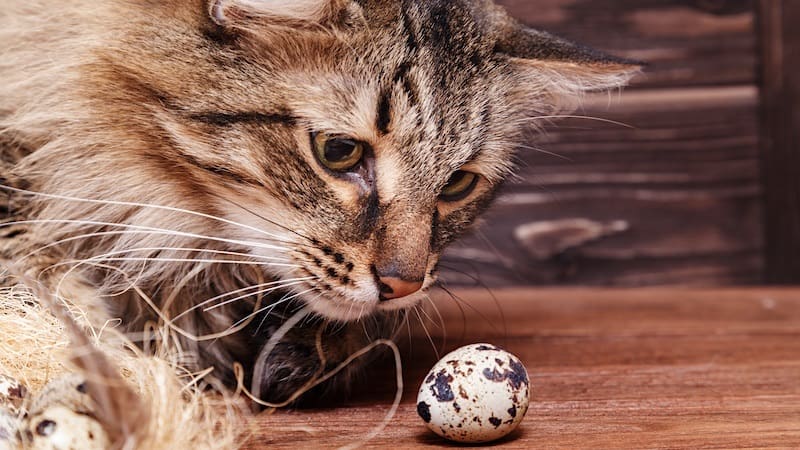
How to Feed Quail Eggs to Cats
Quail eggs can be a healthy addition to your cat’s diet, as they are rich in protein, vitamins, and minerals. However, cats can be picky eaters, so it’s important to introduce new foods gradually.
Start with small portions of quail egg, perhaps by mixing it into their regular meal such as the Blue Wilderness High Protein Indoor Cat Food, to help them get accustomed to the taste. You can gradually increase the amount of quail egg in their diet, making sure to watch for any adverse reactions.
Preparing Quail Eggs for Cats
Raw quail eggs are safe for cats, but ensure that they come from a reputable source to minimize the risk of bacterial contamination. If you prefer to cook the eggs, make sure they are fully cooked to kill off potential bacteria.
Option 1: Raw
- Crack open a fresh quail egg and serve it in a clean dish
Option 2: Cooked
- Hard boil or scramble the quail egg, ensuring it is fully cooked
Remember, it’s best to feed your cat only a small amount of egg to avoid digestive problems. It’s also essential to not add seasonings, as they can be harmful to cats.
Monitor Your Cat’s Consumption
As you introduce quail eggs to your cat’s diet, carefully monitor their reactions and adjust the feeding frequency accordingly. Common signs of distress may include vomiting, diarrhea, disorientation, and increased water consumption.
A good starting point is to offer one or two quail eggs per week, then adjust based on your cat’s tolerance. Always consult with your veterinarian if you are unsure about making changes to your cat’s diet, as they can provide personalized advice based on your cat’s health and nutritional needs.
Potential Benefits and Risks
Positive Health Effects
Quail eggs contain valuable nutrients like vitamins and minerals, which can contribute to a cat’s overall health. They are particularly rich in B vitamins, selenium, and iron. These nutrients can help support a cat’s immune system, promote a healthy coat, and aid in their overall growth and development. Kittens, especially, may benefit from the extra nutrients found in quail eggs.
Additionally, quail eggs are lower in cholesterol and easier to digest compared to chicken eggs. This makes them a more suitable option for people and pets with digestive issues or those conscious of their cholesterol levels.
Negative Health Consequences
However, there are some risks associated with feeding quail eggs to cats. One notable concern is the risk of salmonella, a bacteria that can infect both humans and pets. Consumption of raw eggs or raw egg whites may increase the likelihood of salmonella infection, leading to gastrointestinal symptoms such as vomiting and diarrhea.
Allergies and digestive problems are other potential issues that can arise when feeding quail eggs to cats. Some cats may be sensitive or allergic to quail eggs, resulting in adverse reactions like diarrhea or disorientation. It’s essential to monitor your cat when introducing quail eggs into their diet and consult your veterinarian if your cat shows any signs of distress or negative reaction.
In summary, while quail eggs can provide some benefits to a cat’s health, it is important to consider the risks as well. Pet owners should proceed with caution, monitor their cat’s reactions, and consult with their veterinarian when incorporating quail eggs into their cat’s diet.
Precautions and Safety Measures
Cooked vs Raw Quail Eggs
When feeding quail eggs to cats, it’s essential to consider whether they should be cooked or raw. Cooked eggs, such as scrambled or boiled, are a safer option, reducing the risk of bacteria and parasites. Raw quail eggs might entice your cat due to their carnivorous nature, but they pose health risks like bacterial infection.
Watch for Symptoms and Reactions
It’s crucial to monitor your cat for any adverse reactions after feeding them quail eggs. Symptoms may include vomiting, diarrhea, and increased water consumption. If your cat exhibits any of these symptoms, consult a veterinarian immediately. Keep a close eye on your pet to ensure their wellbeing during this dietary change.
Alternatives and Considerations
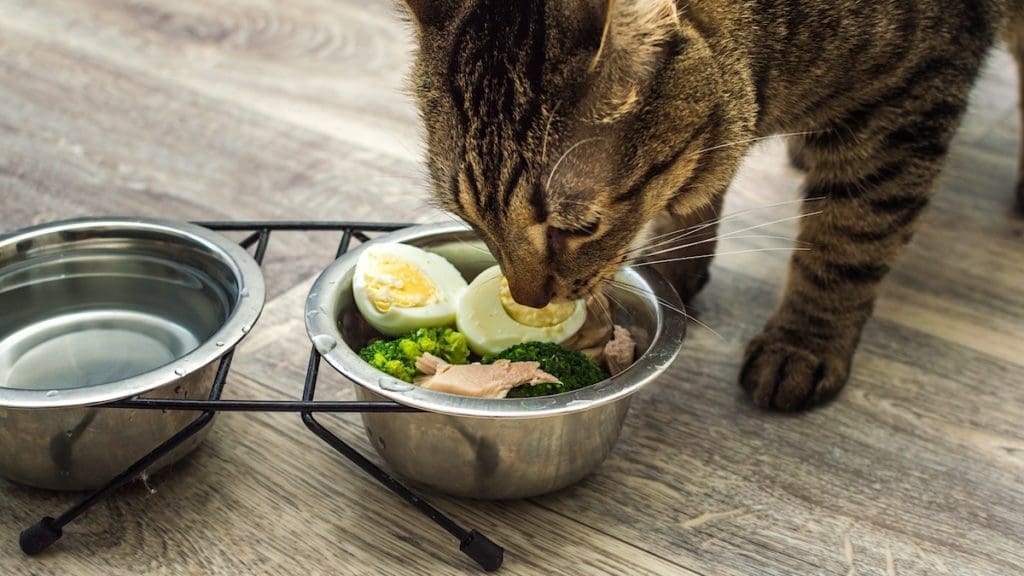
Other Egg Options for Cats
Quail eggs are not the only option for cats to consume. Chicken eggs can also be a healthy addition to their diet, if prepared correctly. A scrambled egg without added salt or seasoning can provide cats with beneficial nutrients, like protein and essential fatty acids.
Balanced Diet
When feeding eggs to your cat, it is crucial to maintain a balanced diet that includes all necessary nutrients. Feeding too many eggs can disrupt the balance, causing deficiencies in other areas. To avoid this, supplement your cat’s meals with various other sources of nutrients, like meat, organs, and possibly even a small amount of eggshell powder.
Eggshell powder can be a helpful source of calcium if used correctly. According to one source, it takes 1/32 teaspoon of eggshell powder to balance one ounce of food.
Occasional Treats
Eggs should be given only as occasional treats, not as the main component of your cat’s diet. This is because cats are obligate carnivores and primarily need an animal-based diet to stay healthy. Too many eggs can lead to health issues, like obesity and nutrient deficiencies.
A moderate feeding schedule and the use of eggs as an occasional treat can help maintain a healthy cat and prevent potential health problems. It is essential to monitor your cat’s health and adjust their diet as needed based on their individual needs.
Frequently Asked Questions
Benefits of quail eggs?
Quail eggs contain protein and fat, making them nutritious for cats, as they are obligate carnivores. They can be a beneficial snack to add to your cat’s diet, providing essential nutrients.
Raw or cooked eggs?
It is generally recommended to cook quail eggs for cats, as raw eggs can carry risks of bacteria or parasites. Cooked eggs, such as scrambled or hard-boiled, can reduce these risks and still provide nutrients.
Can cats eat eggshells?
Eggshells shouldn’t be fed to cats, as they can be sharp and cause digestive issues. Instead, focus on providing the nutritious contents within the eggs themselves.
How many eggs to feed?
Eggs, including quail eggs, should be considered an occasional treat and not a staple in the cat’s diet. Generally, no more than 10% of a cat’s diet should consist of treats.
Feeding frequency?
Cats can have quail eggs as a treat once or twice a week. They should not be fed as a daily snack, as too much can lead to an unbalanced diet.
Alternatives to quail eggs?
There are many other wholesome treats available for cats, such as freeze-dried meat options or high-quality commercial cat treats. It is essential to monitor portions and ensure a well-balanced diet for your feline friend.

